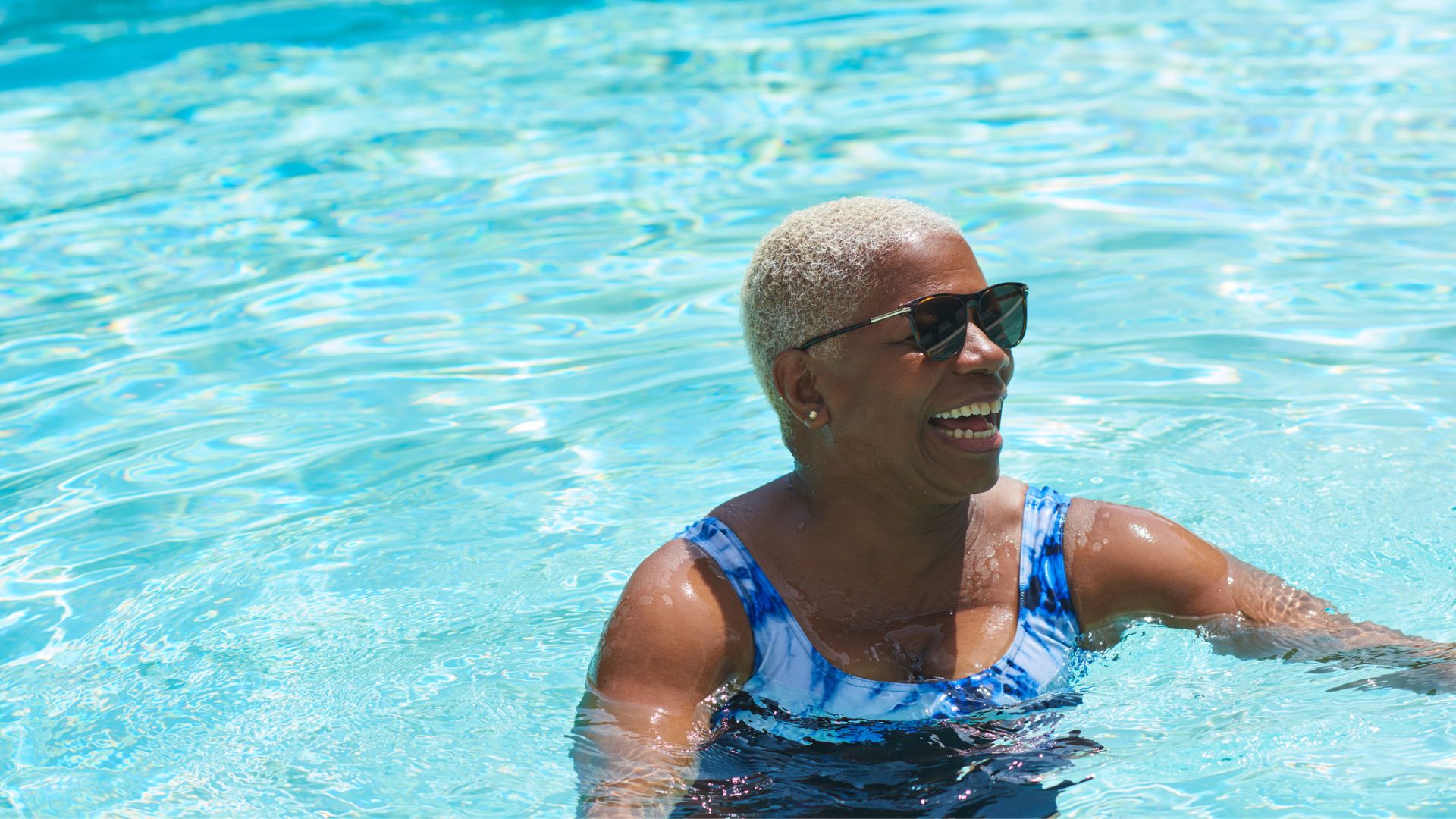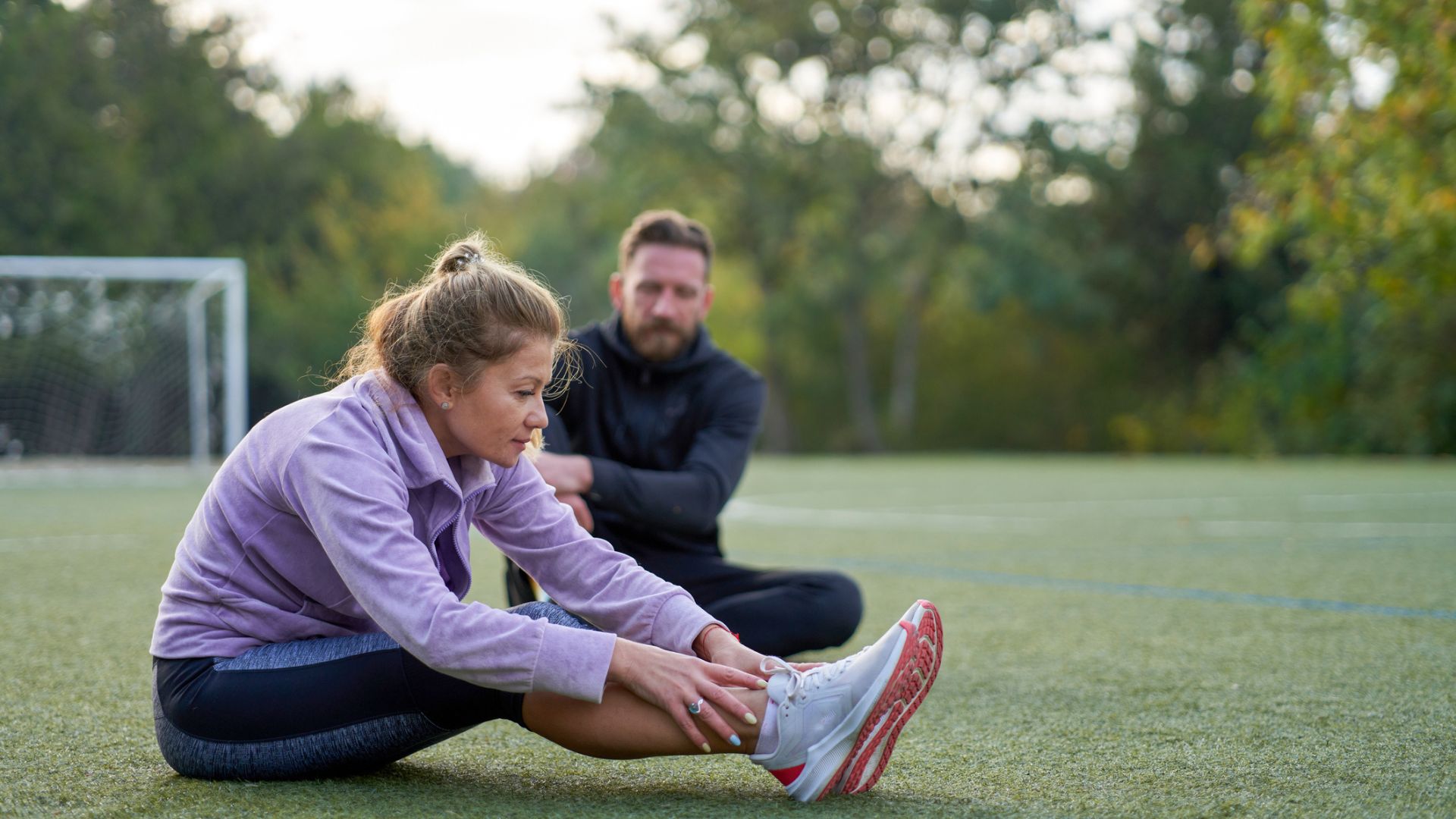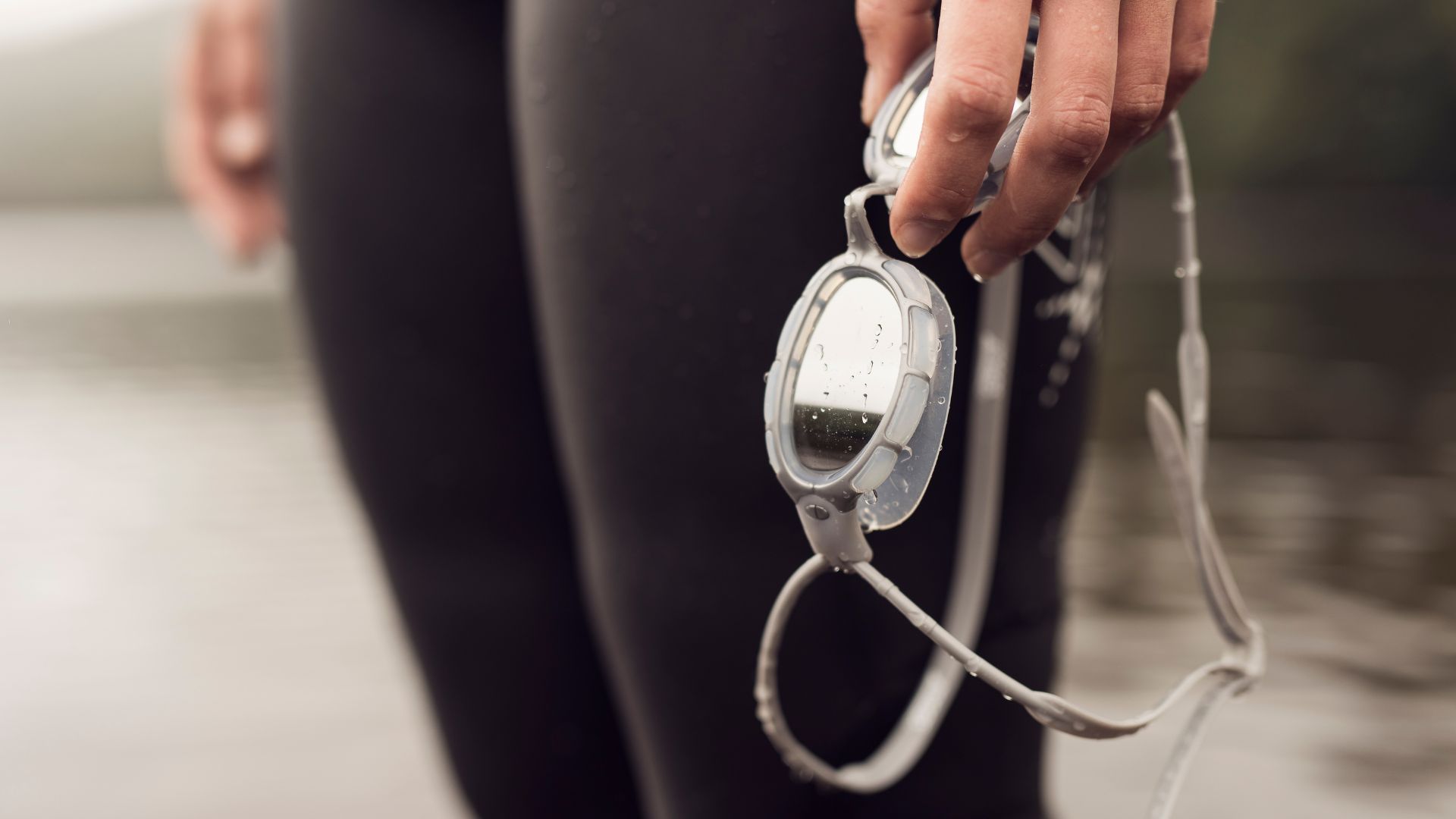Swimming vs running: Which is the better workout for you?
Personal trainers reveal the benefits of swimming vs running for burning calories, muscle gain, injury recovery, and more


The debate of swimming vs running is a common one when it comes to talking about cardio exercise. They're both suitable for beginners, both offer great opportunities to improve cardio fitness, and if you're looking to lose weight healthily, they're both almost as good as each other.
However, there are some key differences between swimming vs running, so it's important to choose the right one for you, depending on your fitness levels, lifestyle, and ultimately how you like to exercise.
So, which should you choose? This depends on what you're looking to get out of the sport. Those looking for a low-impact exercise that stretches and flexes the body may find swimming to be the top choice. But it's important to put stress on the bones and joints to make them stronger, which is where running comes in.
There are many benefits of swimming and many benefits of running for women. Here, woman&home speaks to two certified personal trainers and swimming enthusiasts to weigh up swimming vs running in terms of weight loss, muscle gain, accessibility, and much more.
Swimming vs running
1. For burning calories
Running technically burns more calories than swimming, according to a review by Harvard University. It's one of the reasons why running for weight loss is so popular. According to the institution's research, a typical 155-pound (70kg) person burns:
- 216 calories per 30 minutes, swimming generally
- 288 calories per 30 minutes, running at 12 minutes per mile
- 360 calories per 30 minutes, swimming vigorously
- 450 calories per 30 minutes, running at 8 minutes per mile
However, how many calories running burns compared to swimming will be very individual. "It all depends on the person and effort they put into the sport though," warns Rachel MacPherson, certified personal trainer and fitness enthusiast. "People tend to burn more calories during activities they are new, or do not have efficiency in."

2. For cardiovascular health
When it comes to improving your cardiovascular health, both swimming and running are great choices, says MacPherson. But swimming does have a slight advantage, she points out, according to research by the likes of Pursan University and the University of Belgrade.
Sign up to our free daily email for the latest royal and entertainment news, interesting opinion, expert advice on styling and beauty trends, and no-nonsense guides to the health and wellness questions you want answered.
"It may have some unique benefits, including the creation of new blood vessels. You can also typically swim for longer than you can run, due to the low-impact nature of swimming. Swimmers also tend to have better lung capacity than non-swimmers, which will boost overall cardiovascular health."
For a combination of the two, she suggests, one option is to try something like Fluid Running, where you combine the best of both worlds by running in the water using a floatation device.
3. For growing muscle
This depends on where you want to grow the muscle, says Mike Hamlin, a personal trainer specializing in exercise rehabilitation and weight loss. "If you want to build more muscle in your legs from cardio activity, I would suggest running and more specifically, sprinting. If you want more muscle in your upper body, I would suggest swimming."
In the debate of swimming vs running, he explains, "Running primarily focuses on the lower body, particularly the quadriceps, hamstrings, and calves. It can help tone and strengthen these muscles, but it may not provide much muscle growth unless you can load your legs enough with higher-intensity movements like sprinting."
While swimming is excellent for anyone looking to improve their strength and grow muscle in "the arms, shoulders, and back". Different strokes, such as freestyle, butterfly, or breaststroke will help with this too, as they target specific muscle groups, making for a diverse workout.
Contrary to popular belief, women need to grow muscle too. Given that one of the main symptoms of menopause is muscle loss, which in turn has an impact on mobility and comfort, it's essential to maintain a good routine for muscle maintenance throughout life.
4. For injury recovery
If you're recovering from an injury, it's best to opt for a low-risk, low-impact workout, so swimming is perfect. "Swimming is a non-weight-bearing exercise performed in a buoyant environment, reducing stress on the joints. The water's buoyancy supports the body, minimizing the impact on bones, tendons, and ligaments. This makes swimming an excellent choice for individuals with joint issues or a history of injuries," says Hamlin, who works with Everflex Fitness.
"In contrast, running involves repetitive impact forces that can put a strain on the joints, muscles, and bones. Overuse injuries, such as shin splints or stress fractures, are more common in running compared to swimming," he adds.

5. For injury prevention
Naturally, it's always best to try and prevent an injury before it happens. There's plenty of merit in heavy, weight-bearing exercises but if you're prone to aches, pains, or discomfort when you're working out, it may be a good idea to swap in some lighter exercises in your routine.
"Swimming is an excellent choice for anyone, but in terms of a low-impact workout, swimming has running beat," says MacPherson. "Running can be hard on your knees and hips as it's a high-impact sport. Many people believe running is a natural, easy skill you can pick up and do, but that's not entirely accurate. Issues with muscular imbalances and incorrect running patterns can cause overuse injuries and wear and tear over time."
If you are leaning towards running, it's important to learn proper form before making it central to your workout routine. "Running requires a lot of technique that's important to master before relying on it for all of your cardio work," she says. "Swimming offers a low-impact, less risky option that can be performed in conjunction or in place of running."
6. For reducing stress
Exercise is often listed as a preventative measure when learning how to deal with stress and avoid burnout. While it's not a cure-all and no activity can replace proper mental health aid, working out does have proven benefits for our minds.
But which one's better? There's no right answer here since it's all about what you enjoy most and what makes you feel best. As MacPherson explains, "Not only will you get an incredible cardiovascular workout, but you will also benefit from unique aspects of exercise, including anxiety relief, cognition boost, creation of new blood vessels, improved mood, and better immune system response."
7. For beginners
"I typically love to recommend running to those who are new to exercise," says Hamlin. "More specifically, I will recommend either walking or doing a super-light jog to introduce a new client to this type of activity without stressing them out too much. Running is a great weight-bearing exercise that primarily works the lower body, helping to improve cardiovascular fitness, strengthen bones, and burn calories. It also requires minimal equipment and can be done almost anywhere."
Running is a good exercise to build a solid exercise habit, he explains, which is key for staying consistent if you're new to exercise. If the workout is hard to do, weather dependent, or has too many conflicting factors that may prevent you from going, you're unlikely to keep it up.
"Running helps to get someone doing small amounts of exercise with as little work involved as possible," he adds. "It's simple, put your shoes on and go outside. The pool can be great but you have to drive to one, change, shower, and get dressed again."

8. For cold weather
While not so important in the summer months, working out in cold weather is a reality we all have to face at some point. In this case, running is normally the better option. As it's a high-impact cardiovascular exercise, blood starts moving around the body at a quicker velocity, meaning you warm up faster than you would do swimming. It's also easy to wrap up warm when running, by opting for the best workout leggings over shorts or throwing on a sports sweater.
However, there are many benefits of cold water swimming. If the idea of ice swimming or wild swimming interests you and you're able to invest in the equipment and training, it's worth trying it out.
9. For budget-friendly exercise
This is a tough one since both swimming and running require particular kit items. For running, to get the most out of the activity, you'll need a pair of the best running shoes and a high-impact sports bra, but many of these are available for budget prices and you can run anywhere.
For swimming, you'll need a costume and very importantly, access to a pool or a wild swimming spot, which tend to be harder to come by. You'll also likely need to pay a fee to get into the pool or pond. If you live close to the beach and can swim in the sea, it's free, but you'll need a wetsuit in most cases or you won't be able to go in for very long.
For these reasons, running wins out.

Is it better to swim or run to lose weight?
If you're looking to lose weight, swimming is the better sport. This is simply down to the calories burned, given that swimming is a low-impact but intense cardio workout that utilizes all the muscles in the body. This means that most people will burn more calories in the pool than pounding the pavements, which is essential if you're trying to get into a calorie deficit to lose weight.
As swimming is a low-impact sport, it's also likely to be one you'll be able to do more regularly. So over the course of a week, you'll be able to burn more calories. Naturally, this depends on the person, given the way we burn calories is highly individual and based on numerous factors - including age, height, current weight, activity levels, and even genetics.
However, exercise of any kind is an important tool in the weight loss process. The best exercise for losing weight will be the one you enjoy the most - whether that's running, swimming, strength training, hiking, or power walking. If you enjoy the way you're working out, you're more likely to do it more often. And as the saying goes, consistency is key.
"It all depends on your preferences and accessibility as well as your fitness level and health. If you love running, you should definitely be running if you can and vice versa. Consistency and enjoyment are crucial to creating a lifelong activity habit," notes MacPherson.
How to choose the best sport for you
- Do you have access to a pool? This is the biggest question to ask yourself when choosing between swimming vs running. If you don't have a pool local to you, Hamlin says, the traveling element can lead to a "lot of random excuses and skipping of workouts instead."
- What are your goals? This will hugely impact the sport you choose. Think about what your goals are with changing up your routine to include more swimming or running. For example, if you're looking to improve bone strength in the lead-up to menopause, jogging or running may be a better fit.
- Are you dealing with an injury? If you're recovering from an injury of any kind, it's important to seek professional guidance. However, if it's a lower-body injury then swimming may be the better option. If it's an upper-body issue, running is likely to stress out the injury less than swimming.
- What's your lifestyle like? As noted by Hamlin, there's a lot more that goes into swimming than running. If you only have a limited time to exercise before work, for instance, there's less to do with running to get moving.
Swimming vs running: the verdict
Whether you choose swimming vs running will ultimately come down to your personal preference. What's most important is that you are doing some kind of cardiovascular exercise to boost your physical and mental health, and both activities tick this box.
If you're not sure which one you prefer, include a bit of both in your routine. For example, you could start doing walking as a workout with a day of swimming alongside it every week and progress into running - or vice versa.
As always, if you're thinking about making serious changes to your diet and/or exercise routine, it's best to consult a health practitioner first.

Grace Walsh is woman&home's Health Channel Editor, working across the areas of fitness, nutrition, sleep, mental health, relationships, and sex. She is also a qualified fitness instructor. In 2025, she will be taking on her third marathon in Brighton, completing her first ultra marathon, and qualifying as a certified personal trainer and nutrition coach.
A digital journalist with over seven years experience as a writer and editor for UK publications, Grace has covered (almost) everything in the world of health and wellbeing with bylines in Cosmopolitan, Red, The i Paper, GoodtoKnow, and more.